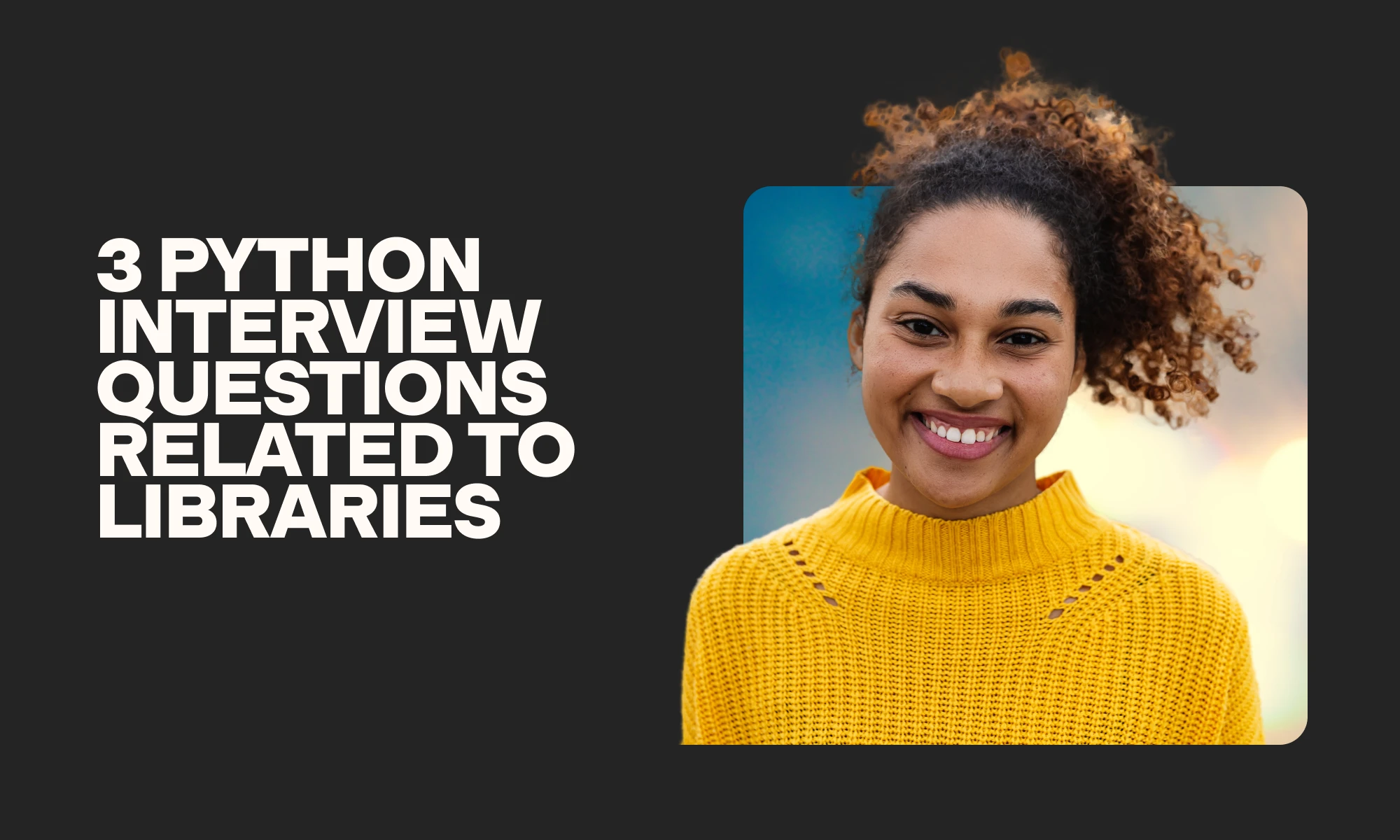Want programmers with the right Python skills? We'll help you find them
Used by seasoned programming experts and entry-level engineers alike, Python is one of the most important programming languages out there.
It helps professionals to create programs, websites, and games, analyze data, and even integrate systems more effectively, but for this, they need to have the right Python skills.
Whether your Python job description is attracting candidates to work on your Python application, game, or website code, it’s critical to evaluate your applicants’ skills correctly.
For this reason, you need to use the right set of interview questions to assess candidates’ skills during the interview phase, even if you’re not a Python expert yourself.
We’ve listed the best Python interview questions in this article, and provided you with answers to the most crucial ones.
However, for the best results, we advise you to use skills tests before you interview applicants, to quickly shortlist the best ones.
With TestGorilla, you can choose between several Python tests, such as:
For the best results, you can combine these with other role-specific skills tests, cognitive ability assessments, or personality and culture tests.
Below, you’ll find the most detailed list of Python interview questions to evaluate your candidates and hire the best Python developers out there.
Let’s get started.
Table of contents
- 27 general Python interview questions
- Answers to ten of the most important general Python interview questions
- 25 Python interview questions related to definitions
- Answers to five of the key Python interview questions related to definitions
- 9 behavioral Python interview questions
- Answers to five of the key behavioral Python interview questions
- 2 Python interview questions related to data analysis
- 26 technical Python interview questions
- 5 essential technical Python interview questions and their answers
- 8 Python interview questions related to object-oriented programming
- 5 essential object-oriented programming Python interview questions and their answers
- 3 Python interview questions related to libraries and their answers
- Which sorts of roles are Python interview questions ideal for?
27 general Python interview questions
The list below features 27 common Python interview questions you can choose from to get a general understanding of your candidates’ proficiency in Python.
Explain what Python is.
Explain how Python 2.x is different from Python 3.x
Could you tell me what are the main features of Python?
Could you outline Python’s main uses?
Is Python a programming language?
Explain what is meant by modules in Python.
How would you explain the difference between tuples and lists in Python?
Explain what is meant by PEP.
What are some of Python’s key benefits?
Why is Python considered a complex programming language?
Could you explain the meaning of a Python namespace?
Could you define what is meant by decorators?
Explain two main comprehensions. What do they do?
Could you explain two main built-in types of data in Python?
Explain how .py and .pyc files are different.
Could you explain what slicing means in Python?
Could you explain what keywords are in Python?
Which best practices should a data engineer or data scientist follow in order to use Python efficiently?
Which approach would you use to get rid of white spaces from Python strings?
Can you explain which processes are used to do run-time checking of code?
What are the hard skills that are required to use Python efficiently?
What are the soft skills that are required to use Python efficiently?
Which approaches do you use to meet deadlines when coding in Python?
What are some of Python’s drawbacks?
How is Python different from SQL?
How does the script mode differ from the interactive mode?
Are you aware of some Python-supported modes for processing files?
Answers to ten of the most important general Python interview questions
Below, you can find a selection of ten of the most important general Python interview questions you should ask candidates, as well as details on the answers you can expect.
1. Is Python a programming language?
Ask your candidates this question to learn whether they are familiar with the basics of Python. The answers you receive in response should outline that even though scripting can be done in Python, it is thought of as a programming language.
Candidates might go into detail about the differences between scripting and programming languages, with top answers covering the fact that programming languages consist of a set of instructions that achieve specific outputs, whereas scripting languages are programming languages written exclusively for a special run-time.
2. Could you tell me what are the main features of Python?
One of the key features that candidates might mention in their responses is that Python is an interpreted language. They may explain that it’s different from C++, which requires the user to compile it before a run.
There are a few other crucial Python features candidates might mention, such as that there is no requirement to specify particular variables, since Python is classed as a dynamically typed language.
Candidates might also mention that functions, which are first-class objects in Python, enable the user to assign them a variable.
3. Explain what are modules in Python
Since modules are critical in Python and are used frequently, ask this question to learn whether your candidates understand what they are and why they are essential.
In response to this, your candidates might mention that modules in Python are best described as files. These files hold code, which, in Python, can take the form of a class or a variable.
4. How would you explain the difference between tuples and lists in Python?
This basic interview question can help you gauge a junior engineer’s technical understanding of Python. A candidate might mention that you can edit lists since they are mutable, contrary to tuples, which are immutable and therefore cannot be edited.
Another comparison that candidates might make is that a list isn’t as fast as a tuple and the syntax of the two is different.
5. Which approach would you use to get rid of white spaces from Python strings?
This question is frequently asked in Python technical interviews to help interviewers understand their candidates’ technical understanding of Python functions. Good answers will mention that the Python String strip() function can get rid of white spaces from Python strings.
Candidates might go a step further and mention that lstrip() or rstrip() can be used to get rid of leading or trailing white spaces.
6. Explain what PEP means.
Candidates’ answers to this question will show you whether they’re familiar with good coding practices.
In response, candidates might outline that PEP means Python enhancement proposal and then explain that PEP comprises several rules or stipulations that help engineers code efficiently.
PEP rules that are contained in a design document also ensure that the code that programmers write is formatted the right way.
7. Explain what Python is.
Candidates should definitely be able to concisely explain what Python is, or also compare it to other programming languages. The best answers will mention that Python is a high-level programming language. Candidates might specify that the data structures in Python are high-level, as well.
They will also explain that Python is used to build software or websites but can also be used for data analysis and task automation.
8. Could you outline what Python’s main uses are?
There are many uses of Python that your candidates must be aware of. For instance, Python is used for creating software and websites, but also in machine learning projects.
Candidates might mention that Python is also used for artificial intelligence, data analytics, data visualization, and programming projects, as well as game development.
Experienced applicants might mention that Python can also be used for search engine optimization and design and that even the finance world uses Python.
9. What are the hard skills that are required to use Python efficiently?
Candidates’ responses to this will give you a clearer perspective on whether they understand which are the required skills for Python and how to improve their abilities. They might mention that algorithm knowledge and analytical skills are essential, and also point out that a solid knowledge of arrays, object relational mapping and front-end technologies is critical.
Candidates might also add that data structure knowledge and skills are essential, as is an understanding of objects.
10. What are the soft skills that are required to use Python efficiently?
Soft skills are also essential when using Python and can help candidates use it more efficiently. Candidates might mention that communication skills and time management skills are crucial when completing projects in Python.
If working in a team, empathy is also essential, and it’s also crucial that candidates recognize the importance of staying organized.
Recommended reading: 3 crucial levels of competency in Python and the best ways to assess them
The best insights on HR and recruitment, delivered to your inbox.
Biweekly updates. No spam. Unsubscribe any time.
25 Python interview questions related to definitions
Take a look at the following 25 Python interview questions and select from the list to evaluate your candidates’ understanding of Python’s features, methods, and keywords.
Explain what a unit test is in Python.
Explain what docstring is in Python.
What do you understand by negative index?
How would you explain the meaning of pass in Python?
Explain what dict comprehensions are.
Explain what list comprehensions are.
Can you explain what a generator is?
Describe what the lambda function does.
What is multithreading in Python?
Explain what len() does in Python.
Explain what an operator is.
Explain what a membership operator is.
What is a ternary operator in Python?
What is meant by help() in Python?
What is meant by dir() in Python?
Define what Python literals are.
Explain what the zip() function does in Python.
What are the main Python parameter passing mechanisms?
What is meant by remove() in Python?
What is meant by a del statement in Python?
Can you explain the swapcase() function? What does it do in Python?
What is join() in Python?
What is a break statement used for in Python?
What is an iterator in Python?
Explain what the enumerate() function does.
Answers to five of the key Python interview questions related to definitions
Take note of the answers to five of the most vital questions related to Python definitions and knowledge.
1. What is meant by remove() in Python?
Candidates who are proficient in Python will be able to explain what remove() means. This method enables engineers to remove the first occurrence of the element with the specified value.
2. What is meant by a del statement in Python?
Candidates with the right technical skills and knowledge in Python will be able to explain that the del statement or keyword is primarily used to delete objects in Python. For example, engineers can use it to delete or slice lists, delete dictionaries, or get rid of variables.
3. What is join() in Python?
Capable candidates with technical Python knowledge will know that join() is a method used to combine all items into a string. A good answer will outline a flexible approach for making a string from several iterable objects.
Find your next Python programmer with online skills testing
It's quick and easy to create a talent assessment with us. Book a free live demo and we'll show you how.
4. What is an iterator in Python?
Ask candidates this question to learn whether they have in-depth knowledge of this critical feature in Python.
In response, candidates might mention that iterators are containers for objects. They might also explain that iterators enable engineers to traverse through all the elements of a collection.
5. What is a break statement used for in Python?
Candidates who have used Python extensively will know what a break statement is. They might explain that break statements enable you to exit a loop when an external condition is triggered. They might also mention that engineers use the break statement following a conditional if statement in the code.
9 behavioral Python interview questions
Use the behavioral interview questions listed below to learn more about the actions your candidates will take when faced with challenging Python tasks and discover more about their specific experiences with Python.
Tell me more about your experience with Python.
For how long have you used Python?
What method do you use for task prioritization?
What strategy or approach do you use if you’re unclear about what a project requires?
What approach do you use to begin working on a new project?
Have you built any applications with Python?
What approaches would you use for module importation in Python?
Have you ever made a mistake with Python? Name a few errors you should try to avoid.
How do you stay organized when carrying out a project in Python?
Answers to five of the key behavioral Python interview questions
The following five vital behavioral Python interview questions listed in the section below feature sample answers that your candidates might give.
1. For how long have you used Python?
Although you might not be looking for a candidate who has experience only with Python, you might still need a candidate who has plenty of experience using this programming language.
Candidates might respond by explaining that they have worked with Python for a substantial period and can use Python efficiently without any problems. The candidates who explain how exactly they benefit from the efficiency of Python are the ones to watch.
If your candidates haven’t used Python, they should be able to outline how they would get used to this programming language and use it if hired for your position.
2. Have you built any applications with Python?
This question is vital. Answers will give you an insight into your candidates’ understanding of Python, their abilities to use it to accomplish a project, and whether they seek to constantly improve their Python skills.
Side projects can give engineers an additional way to experiment and learn ways to code more efficiently, and the best answers will come from candidates who enjoy using Python to innovate and build software.
3. What approaches would you use for module importation in Python?
Your candidates might outline a few different approaches they use for module importation in Python. Their answers should include that the keyword import is crucial for importing modules.
Candidates might then explain a few commands that feature the import keyword, such as: “import array” or “from array import *.”
4. Have you ever made a mistake with Python? Name a few errors you’d try to avoid.
Applicants might mention a few mistakes they have made with Python, but what’s important is that they know how to avoid these errors in the future. In candidates’ answers, look for proof that they’ve put in place strategies to avoid them. Are they actively learning from their mistakes and do they know how to prevent them in the future?
Some of the common mistakes that junior engineers make in Python include failing to use spaces instead of using a tab or forgetting to analyze the code frequently in Python to avoid making typos that go unidentified.
5. What’s your approach to working on a new project?
This question is crucial because it will help you understand whether your candidates’ approach to new tasks enables them to execute a project efficiently. Communication is vital in this case. Take note of candidates who communicate efficiently with stakeholders and project managers to establish the requirements of the task.
Also, take note of candidates who take steps to clarify a project’s requirements if they are unsure what’s needed. Candidates might also mention that they’d begin by thinking about the problem which needs to be solved and outline the processes they’d need to take to solve it with Python.
2 Python interview questions related to data analysis
If your open position requires your successful candidate to understand how Python can be used for data analysis, here are two Python interview questions you can ask to find out their knowledge in this area. We have also provided sample answers to each of these in this section.
1. Is Python useful for data analysis? Could you explain how?
Answers that candidates provide should explain that Python can be used at every stage of bigger data analysis projects, particularly because of its libraries.
Your candidates might also describe three of the specific ways in which they would use Python for data analysis: data visualization, data mining, and data processing.
2. What do you know about Python’s map() function?
Map() functions are essential in Python as they help engineers apply a transformation function to items in an iterable. The outcome of the map() function is new iterables.
Candidates might explain that if they wanted to carry out the same operation for all input iterable items, they would use Python for the loop.
26 technical Python interview questions
These next 26 Python interview questions are ideal for getting to know more about your candidates’ technical Python know-how and skills. Choose from the list below.
What are yields in Python and what do they do?
Explain how shallow copy and deep copy are different.
Which processes are involved in memory management in Python?
Name a few examples of arguments in Python.
Explain what functions in Python are.
Would you say Python is an uninterpreted language or an interpreted language?
What are the main differences between class variables and instance variables?
What are the main differences between global and local variables in Python?
How is file deletion accomplished in Python?
Can you explain what type conversion means in Python?
Can you explain how range and xrange are different?
Can you outline the difference between unpickling and pickling?
What approach would you use to add a multi-line comment?
Can you explain when negative indexes should be used in Python?
Explain what packages in Python are.
Could you give examples of some different Python libraries?
What do you think are the main benefits of Flask?
What are your methods for tracking your code versions?
Which process do you use to locate bugs in code in Python?
Which approach do you use to make NumPy calculations?
Which approach do you use for making visualizations with Num/SciPy?
Would you say that lists are preferred over NumPy? Why or why not?
If you wanted to locally save images, how would you do this with Python?
Explain what self means in Python.
Which approach would you use for random number generation in Python?
What are Django templates made up of?
5 essential technical Python interview questions and their answers
Below, we’ve picked the five most essential technical Python interview questions and outlined the sample answers you can expect from your top candidates.
1. Explain how shallow copy and deep copy are different.
Your candidates should mention that whereas shallow copy serves to maintain the copied values in a new instance, the reference pointers are not copied in deep copy.
Some candidates might further elaborate on the benefits of shallow copy compared to deep copy and explain that shallow copy facilitates quick program execution, whereas deep copy lengthens the program execution time.
2. Which processes are involved in memory management in Python?
Candidates should have a solid understanding of memory management in Python, as it’s essential to writing efficient code. The best candidates will mention a few processes involved in Python memory management, including:
The private heap space in Python, which contains objects and data structures
The collector, which is used to recycle memory that is unused
3. Name a few examples of arguments in Python.
Ask this technical question to learn whether your candidates understand what arguments in Python are and whether they can give you a few key examples.
Your candidates should know that arguments are values provided to a function to show that the value represents that particular function.
They might then give some examples of arguments in Python, which include:
Keyword arguments, including arbitrary keyword arguments
Positional arguments, including arbitrary positional arguments
Default arguments
4. Explain what functions in Python are.
Are your candidates savvy when it comes to the technical aspects of Python? If they are, they should know what functions are.
The best responses will identify that functions might be described as code blocks that need to be called if you want to execute them. Candidates might also explain that if you wanted to define functions in Python, you’d use the keyword “def.”
5. Explain what packages in Python are.
In Python, a package is basically a directory with Python files. Candidates might mention that a package in Python is beneficial for structuring a module namespace. They also might go on to explain that many modules can be put into packages and that these files will be named _init_.py.
8 Python interview questions related to object-oriented programming
Take a look at the next 8 Python interview questions that are linked to object-oriented programming and choose from the list to assess your candidates’ skills.
What are some examples of inheritance in Python? What does inheritance do?
How would you create a class in Python? What do classes enable?
Explain what monkey patching means in Python.
Are multiple inheritances supported by Python? Can you give an example of a programming or scripting language that does?
Explain what polymorphism means.
Explain what encapsulation means.
Which process would you follow to carry out data abstraction in Python?
If you wanted to make an empty class, how would you do this in Python?
Want data-driven test results?
See how the top candidates compare with our easy-to-understand test results
Want data-driven test results?
See how the top candidates compare with our easy-to-understand test results
5 essential object-oriented programming Python interview questions and their answers
The next section features 5 of the most important Python interview questions related to object-oriented programming. We’ve also provided ideas of what the best answers should contain.
1. What are some examples of inheritance in Python? What does inheritance do?
If an engineer wanted to enable one class to get every member from another class, they could do this with inheritance. Candidates might also mention the advantages of inheritance, which enables engineers to reuse code with very little difficulty as far as application maintenance is concerned, before describing the main types of inheritance:
Multiple inheritances, in which one derived class gets inherited from several base classes
Hierarchical inheritance, in which it’s possible to inherit several child classes from a single base class
Single inheritance, in which a single derived class inherits from one superclass
2. How would you create a class in Python? What do classes enable?
Creating a class in Python requires an engineer to use the keyword “class.” It enables engineers to bundle data and functionality together, with the purpose of creating a new type of object.
Creating classes also permits an engineer to make new instances that relate to the specific object type.
3. Are multiple inheritances supported by Python? Can you give an example of a programming or scripting language that supports them?
Asking this question will help you understand whether your candidates have an in-depth understanding of Python and other programming languages. Some candidates might first explain what multiple inheritances are, and that with them a class might be obtained or originate from several parent classes.
Candidates might then mention that Python is capable of supporting multiple inheritances and give examples of other programming languages that support them, such as C++, Dylan, Perl, R, or Raku, for example. They might also point out that Java, for example, does not support multiple inheritances.
4. Explain what polymorphism means.
Polymorphism is an approach for enabling objects to take different forms. Candidates might also explain that the main benefit of polymorphism is that engineers can carry out the same action using different approaches.
It means that objects can be processed in different ways, which rely on the class or data type.
5. Explain what encapsulation means.
If you wanted to bind together data and code, you’d use encapsulation in the process. Candidates might explain that one instance of encapsulation is a Python class.
3 Python interview questions related to libraries and their answers
Since candidates for your open position need to understand how libraries are connected to Python, these three Python interview questions are essential.
Use them to find out whether they are confident with Python libraries and take a look at the sample answers for each.
1. How does Django compare with Flask?
Candidates should be able to explain some of the key differences between Django and Flask.
One important consideration when comparing Django and Flask is that Flask is easier to use.
The Flask microframework:
Supports application programming interfaces
Is used for fast development projects
Isn’t monolithic
Is classed as a WSGI framework
Django, on the other hand:
Doesn’t support an application programming interface
Is used for easier or more basic projects
Is monolithic in terms of how it operates
Is classed as a web framework that is full-stack
2. What does a session do in Django?
If a user wants to store any data or recover it in Django, a session facilitates this. Sessions work using abstraction; session ID cookies are placed on the client side. In Django, security is enhanced, as the data doesn’t get stored on the client-side.
3. Which method would you use for establishing a database in Django?
When answering this question, candidates might mention that the mysite.setting.py command edit is used.
Good answers will mention that SQLite is used by Django; it’s a default database, and no other installations are needed. For other database servers such as Oracle or PostgreSQL, however, engineers might use admin tools and incorporate the setting.py code to achieve this.
Which sorts of roles are Python interview questions ideal for?
In addition to software development, programming, and engineering positions, Python interview questions are ideal for data analysts. But that’s not all. Some more positions for which you might use Python interview questions include:
Machine learning engineer roles
Data scientist positions
Python developer jobs
Jobs in the field of artificial intelligence (AI)
To get the most out of your interviews, you should always align the interview questions to the role you are hiring for, as well as to your organization’s needs. For instance, if you’re hiring for a position that extensively uses object-oriented programming, consider adding some Python OOPs interview questions into the mix.Use the list of questions in this article to get inspired and define which are the most important questions you need to ask your applicants, in order to evaluate their skills and get to know them better. You can also check out more advanced Python interview questions.
Before you invite your candidates to an interview, however, we advise you to evaluate their skills with the help of a skills assessment, consisting of different pre-employment screening tests. This way, you’ll be able to easily filter out unsuitable applicants and only concentrate on your best talent, which helps you ensure your time to hire remains low.
You’ll then have no problem selecting the best candidates during the interview, especially if you have the right Python interview questions at hand.
You've scrolled this far
Why not try TestGorilla for free, and see what happens when you put skills first.





















